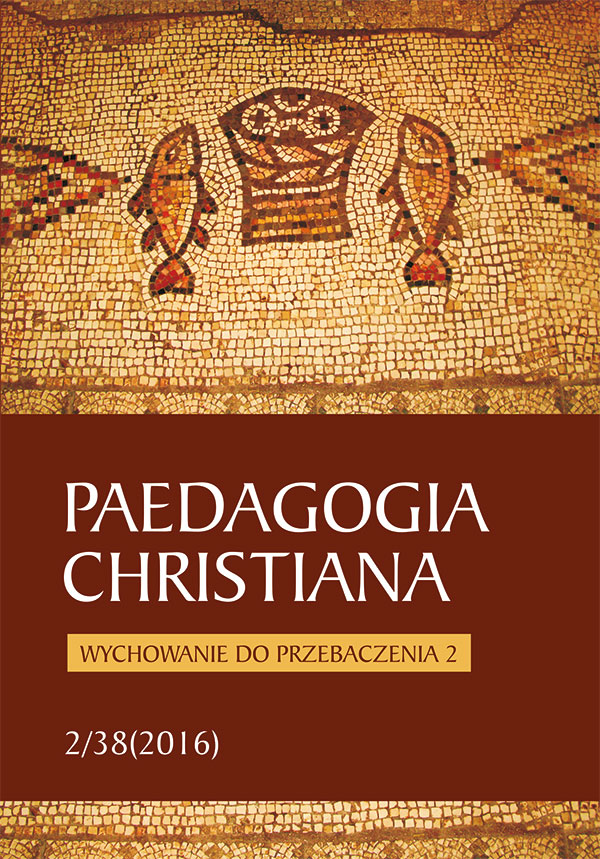Education for Forgiveness
DOI:
https://doi.org/10.12775/PCh.2016.022Keywords
forgiveness, situation of forgiving, education for forgivingAbstract
Forgiving is one of the most difficult psycho-spiritual human processes and forgiveness – one of the existentially most important decisions and a condition for a healthy development. Social sciences, as well as philosophy, provide justification for that. Therefore, the education for forgiving is of great importance. It could be regarded as a lifelong predisposition to forgive, a positive attitude and skills associated with such behaviour. The author proposes, however, a broader approach. It is believed that forgiving is a process, which puts all participants in the specific situation – the situation of forgiving. This situation arises around forgiveness as a value. The author chooses a personalistic approach when speaking about a man. In light of this approach the discussed situation is deeply personal, determined in its course by anti-personal or personal relationships. It is assumed that the true forgiveness requires acceptance of personal attitudes by all those involved in this situation. The difficulties associated with it can be reduced through education for forgiving. It includes, as a basis, the education for personal values – among them – for forgiveness and the situation of forgiving. The most important educational path has a form of a contact with specific examples of the implementation of these values and most of all – a direct experience of their implementation by others in one’s own life. Christian education is of particular importance to the education for forgiving. On the one hand it shows the reasons for forgiving – God’s unconditional love and endless willingness to forgive the others. On the other hand, it gives and explains the ways of building the attitude of forgiving in oneself and others; it supports efforts in this sphere of life.References
Jan Paweł II. „Kochajcie życie – ten dar i misję, które Bóg Wam powierza”. W: Podręcznik Pokolenia JPII. Ojcowskie słowo do młodych świata, Polski i Lednicy. Poznań: Duszpasterstwo Akademickie Dominikanów, 2008.
Kołakowski, Leszek. Mini wykłady o maxi sprawach. Kraków: Wydawnictwo Znak, 2004.
Korczak, Janusz. Pisma Wybrane, t. II. Warszawa: Nasza księgarnia, 1978.
Król, Aldona. „Wychowanie do przebaczenia”. W: Wychowanie chrześcijańskie. Między tradycją a współczesnością, red. Alina Rynio, 432–442. Lublin: Wydawnictwo KUL, 2007.
Olbrycht, Katarzyna. „Wychowanie do wartości – w centrum aksjologicznych dylematów współczesnej edukacji”, Paedagogia Christiana 1 (2012): 89–104.
Olbrycht, Katarzyna. Prawda, dobro i piękno w wychowaniu człowieka jako osoby. Katowice, Wydawnictwo Uniwersytetu Śląskiego w Katowicach, 2000.
Ostrowska, Krystyna. „Psychologiczna analiza procesu przebaczania (w aspekcie wiary chrześcijańskiej)”. Biuletyn Stowarzyszenia Psychologów Chrześcijańskich 8 (1997): 4.
Ponikło, Tomasz. Józef Tischner. Myślenie według miłości. Ostatnie słowa. Kraków: Wydawnictwo WAM, 2013.
Sobór Watykański II. „Konstytucja Duszpasterska o Kościele w świecie współczesnym Gaudium et spes”. W: Sobór Watykański II. Konstytucje, dekrety, deklaracje. Poznań: Pallottinum, 2002.
Wojtyła, Karol. Osoba i czyn oraz inne studia antropologiczne. Lublin: Wydawnictwo Towarzystwa Naukowego KUL, 1994.
Downloads
Published
How to Cite
Issue
Section
Stats
Number of views and downloads: 2624
Number of citations: 0



